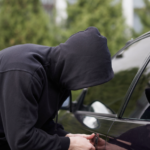Proof of Stealing or Taking a Motor Vehicle Can Be Elusive for Prosecutors

A recent incident involving five teenagers allegedly stealing a car before crashing into another vehicle two days later and causing serious injuries to one of the occupants of the stolen car has potentially left prosecutors with difficulties in establishing criminal responsibility – including who if anyone in fact stole the car and whether any of the occupants actually knew it was stolen at the time they entered it.
The Incident
Police allege the four male teens, aged 17, 16 and two aged 13, and one female aged 15, stole a Toyota Camry from Flora Hill, about 3 kilometres south of Bendigo in Victoria on the night of Wednesday, 25 September 2024.
It is alleged that at about 8.45am on Friday, 27 September 2024 CCTV footage captured the vehicle veering onto the wrong side of the road before colliding with a Lexus SUV at an intersection in Warranwood, about 28 kilometres east of the Melbourne CBD.
The four males are said to have then fled the scene, leaving the injured female behind.
Emergency services arrived and administered first aid to the female, who was then taken to the Royal Children’s Hospital in a critical condition and underwent emergency surgery. Fortunately, she is now in a serious but stable condition.
The four males were arrested a short distance from the scene. The alleged 17-year driver was charged with 9 offences including dangerous driving causing serious injury, theft of a motor vehicle, intentionally causing injury, attempted theft of a motor vehicle, assault with a weapon and failing to assist at an accident.
The 16-year-old passenger was charged with theft of a motor vehicle and failing to assist after an accident.
The two 13-year olds were released pending further investigations.
All of the charged teens will face the charges in the state’s Children’s Court.
While these offences are alleged to have occurred in Victoria, there are equivalent offences in New South Wales
The Offence of Stealing Motor Vehicle in New South Wales
One of these offences is stealing a motor vehicle, vessel or trailer, which is contained in section 154F of the Crimes Act 1900 (NSW) (‘the Act’) and carries a maximum penalty of 10 years in prison.
To establish the offence, the prosecution must prove beyond reasonable doubt that:
- You took a motor vehicle,
- You were not legally authorised to take that vehicle,
- You knew you were not legally authorised to take the vehicle, and
- You intended to permanently deprive the owner of the vehicle.
An attempt to steal is sufficient to for the purposes of the offence.
A ‘motor vehicle’ is defined as:
- A vehicle built to be propelled by a motor that forms part of it,
- Any part of such a vehicle that contains an identification number, or
- A motor that is capable of forming part of a vehicle.
A ‘vessel’ is a water craft of any description used or capable of being used as a means of transportation on water.
In the case of the teens, it could be difficult for the prosecution to prove this charge against any of the occupants given there does not appear to be evidence regarding who, if any of them, actually ‘stole’ the car two days prior, or even if any or all of them actually knew the car was stolen.
The Offence of Taking a Conveyance Without Consent in New South Wales
The offence of taking a conveyance without consent is broader in scope and therefore not as difficult to establish as the offence of stealing a motor vehicle.
Taking a conveyance carries a lower maximum penalty of 5 years in prison. The offence falls under section 154A of the Act and requires the prosecution to prove beyond reasonable doubt that:
- You took and drove a conveyance or took a conveyance with the purpose of driving or secreting it, or to obtain a reward for its restoration or pretended restoration, or for any other fraudulent purpose, and
- You did not have the owner’s consent to do so or the consent of another person in its lawful possession.
Or alternatively:
- You drove or were carried in a conveyance,
- The conveyance was taken without the owner’s consent, and
- You knew it was taken without the owner’s consent,
A ‘conveyance’ is any motor car, motorcycle, bicycle, cart, wagon, cab, carriage, caravan, trailer, motor lorry, tractor, earth moving equipment, omnibus, tank or other military vehicle, ship or vessel used or intended for navigation.
While the offence of taking a conveyance is broader than stealing a motor vehicle, the prosecution would still need to prove the above essential elements (ingredients) in what appears to be the absence of proof regarding who actually took the car and/or whether the occupants knew it was taken without the owner’s consent.
Joint Criminal Enterprise / Common Purpose
The situation relating to the above offences is complicated by the doctrine of joint criminal enterprise, which is also known as common purpose.
This doctrine essential states that where each of the individuals involved in acts relating to the offence have agreed to and been part of it, all of the individuals can be deemed liable for the principal offence (eg the offence of stealing a motor vehicle) even if they did not physically commit every act required to prove the offence.
In the case of the teens, however, the prosecution would need to prove that such an agreement occurred, which can be difficult in the absence of ‘admissions’ (also known as confessions) by the alleged participants which are consistent with one another.
Legal Defences to the Charges
A legal defence to charges of stealing a motor vehicle and taking a conveyance is having a ‘claim of right’ over the property, which is where you genuinely believed you were legally entitled to the whole of it. Duress and necessity are also defences to the charge.
In the event you are able to raise evidence of a legal defence, the onus then shifts to the prosecution to prove beyond a reasonable doubt that the defence does not apply to the circumstances of the case.
You are entitled to an acquittal if the prosecution is unable to do this.
Going to Court for a Criminal or Traffic Offence?
If you have been accused of an offence of larceny, theft or stealing, it is important to engage specialist criminal defence lawyers with a comprehensive understanding of the law who are able to formulate and implement effective defence strategies, which include building corroborating defence evidence, identifying available legal defences and ensuring the prosecution is put to proof.
Expert defence lawyers will often be able to have cases withdrawn at an early stage in the proceedings by drafting and sending ‘representations’ to prosecutors which make clear the allegations cannot be proven to the required standard, then pushing for withdrawal, or, if the charges nevertheless proceed to a defended hearing (in the Local or Children’s Court) or trial (in a higher court such as the District Court) having them dismissed in court.
Call Sydney Criminal Lawyers today on (02) 9261 8881 for specialist advice and formidable representation for your criminal matter.
We offer a free first conference for those who are going to court.







